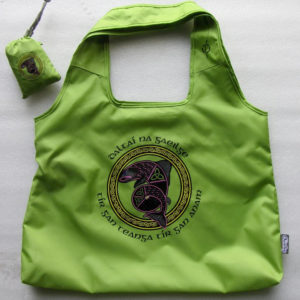Forum Replies Created
-
AuthorPosts
-
Aengus
Participant“Graiméar Gaeilge na mBráithre Críostaí” says that the singular noun is used after the plural possessive adjectives ár, bhur, and a when each person only has one of the thing referred to. So “inár gcroí go deo”.
But it adds as a footnote that “inár gcróithe” is also used
> ar lorg na n-aidiachtaí sealbhacha iolra ár, bhur, a, nuair nach bhfuil
ach ceann amháin de na rudaí dá dtagraíonn an aidiacht ag gach duine
(rud) atá i gceist: beidh Íosa inár gcroí; ar a n-aigne; fágadh na báid
ar a mbéal fúthu; bhí na saighdiúirí go léir ina luí ar a mbéal is ar a
n-aghaidh; agus i bhfrásaí mar: ar a gcoiscéim; ar ár gcois
> Deirtear fosta inár gcroíthe.http://www.forasnagaeilge.ie/wp-content/uploads/2016/06/GGBC_19990-2.pdf
Leathanach 69Aengus
Participanta lán taitnimh (tuiseal ginideach tar éis “a lán”)
as an mbliain (or “as an bhliain” in Gaeilge Uladh)Go n-éirí an bóthar libh implies travel -just “Go n-éirí libh” or “Go n-éirí an t-ádh libh”
It’s “todhchaí”, not “tochaí”, but “don todhchaí” doesn’t really work here – it’s a bit literal. “Sa todhchaí” might be marginally better, but “go n-éirí” already implies a wish for the future, and adding “sa todhchaí” doesn’t really help.
“agus le togáil a scoil nua” – I’m not sure what you’re trying to say here, but if it’s “and with building the new school”, then you need “leis an scoil nua a thógáil”
Ádh mór leis an scoil nua a thógáilBain taitneamh as do laethanta saoire. (Maybe spellcheck changed that to Saoirse?”
Note that you used the plural in “Go n-éirí libh”, but the singular in “bain taitneamh as do” – the plural would be “bainigí taitneamh as bhur”
Aengus
ParticipantThis response might be a bit late, but you can just capitalize the first word, as you did in your question. In English, you could capitalize all the words (Always In Our Hearts), but that’s a bit more complicated in Irish – gConaí and gCroíthe are straightforward enough (don’t capitalize the urú), but inár is a compound of “i” and “ár”, and I’m not sure if “InÁr” would be appropriate, or whether you would stick with “Inár”.
But I would also suggest that “go deo” is probably more common than “i gcónaí” in this type of phrase – “Inár gcróithe go deo”.
Aengus
ParticipantThere isn’t a “rule”, as such. To quote Ó Dónaill, in the FGB entry for “ar”:
“(In references of a general nature it does not normally affect initial letter of following noun, e.g. ar muir, ar cíos, ar cosa in airde, on sea, rented, galloping. In qualified or particularized references it lenites, e.g. ar mhuir na beatha, ar chíos mór, on the sea of life, at a high rent. Eclipses in a few instances, e.g. ar gcúl, backwards)”.“ar ndóigh”, “ar gcúl”, “ar dtús” and “diaidh ar ndiaidh” are probably just historical anomalies.
Aengus
Participant“Gabh i leith” means “come here”. When pronounced “goille”/”gulla”, it’s often the equivalent of “c’mere”, ie an informal “come here” that isn’t actually an order, just an announcement that I have something to say (“come here to me”, “come here till I tell you”).
“Cogar” can also be used in the same way.
“Gabh i leith, ar chuala tú faoi ….”
“Cogar, ar chuala tú faoi ….”Aengus
Participant“Ar dhéis Dé go raibh a (h)anam (dílís)” is undoubtedly the most common, widely used even among people with very little Irish.
“Cómhbhrón ó chroi” is
“anam” can be qualified with “dílis” or “uasal”.
“Ní maith liom bhur dtrioblóid”/”Ní maith liom do thrioblóid” is the equivalent of “I’m sorry for your troubles”.
Almost every death in Ireland is marked on http://www.rip.ie, and friends and family members leave condolence messages there, if you want to look for further examples.
Aengus
ParticipantHugo is correct – “theas” isn’t a noun, so you can’t say “sa theas” – it just doesn’t make any sense in Irish.
Apart from the grammar, from a phonological point of view it’s also uncomfortable to say, because words that start with “t” don’t take a séimhiú after “sa”, (you say “sa teach” or “sa tuaisceart”, for example), so “sa theas” just feels wrong, (even though the “h” in “theas” is just a normal part of the word, and “theas” isn’t the noun “teas” (heat/warmth) with a séimhiú).
You can say:
Tá sé ina chónaí theas i gCorcaigh.
Tá Corcaigh sa chuid theas den tír.
Tá Corcaigh taobh theas de Tiobráid Árann. -
AuthorPosts
